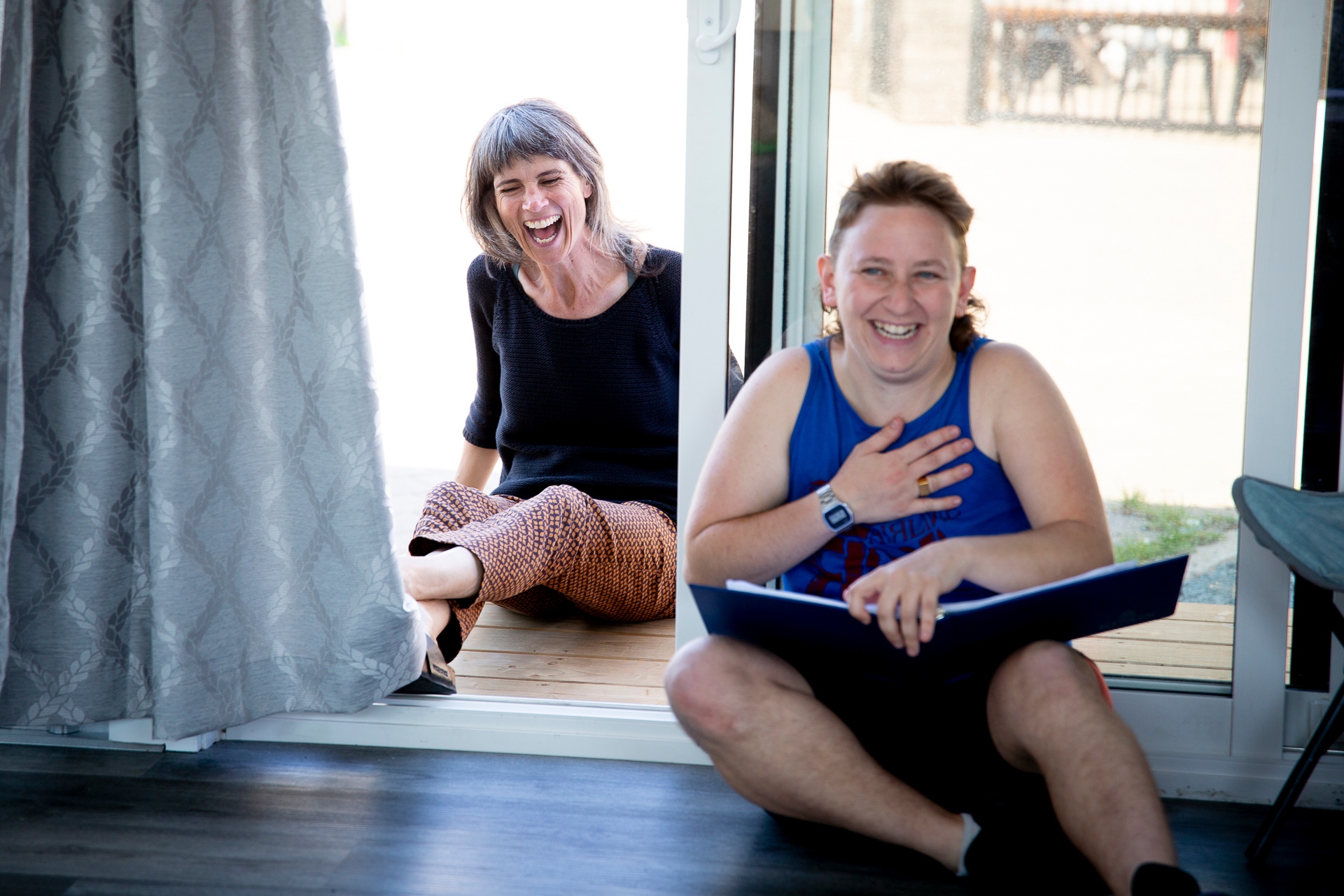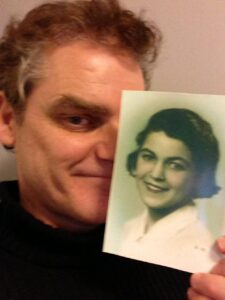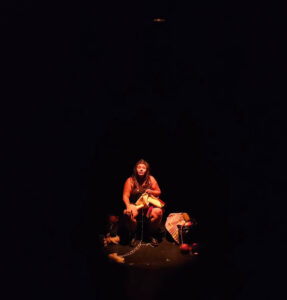
Geneviève Steele and Rooks Field-Green. Photo by Daniel Wittnebel.
Colleen MacIsaac began writing their new play A Beginner’s Guide to the Night Sky in 2021 during a residency at Ross Creek Centre For the Arts in Canning, Nova Scotia where the writing prompt, aptly, was to create a play that could be performed outside. The prompt made MacIsaac think about their father who is an amateur astronomer. “I was thinking a lot about [how] it would be cool if I did something that involved the night sky,” they say. Now A Beginner’s Guide to the Night Sky, a Villains Theatre production presented by Eastern Front Theatre, directed by Garry Williams, is playing under the stars at Ferry Terminal Park in Dartmouth until October 8th.
The play tells the story of Albertine, played by Geneviève Steele, and her non-binary child, Léo, played by Rooks Field-Green, as they navigate Albertine’s diagnosis with early-onset Dementia, while also working together to teach an astronomy class, which Albertine is very passionate about. The themes draw very closely from MacIsaac’s own experience; their father has a similar Neurological disorder to Albertine, their mother was a kindergarten teacher throughout most of her teaching career, and MacIsaac is their non-binary child. The play also feels very immediate for Steele and Field-Green, who both identify very intimately with their characters.
“I feel a very strong connection with [Albertine] and my mother,” says Steele, “I’m sort of playing my mum a bit. So, I feel her very close to me, which is also very nice. [Albertine] is French, and she’s passionate, she loves the sky, she loves her child, and she loves sharing her enthusiasm with the people, and it’s a gift to get to play her every night.”
Rooks Field-Green began working on the show when it was in OutFest last April as an Assistant Director and Stage Manager, and fell fully in love with the script. “It was really fun to get to think about it from that perspective, and then there was an opportunity to move into the role of Léo, and… I felt so drawn to play Léo and really followed that, despite my better judgement.” He laughs heartily, “I felt a lot of kinship with this character, which I think you get when you’re pretty starved for non-binary representation in theatre shows, especially [a story] that is quieter, the main part of the story isn’t about their gender, they just happen to be non-binary, and are living through this moment of grieving and trying to understand why the world works the way it does and what to gain from it.”
Field-Green also identifies with the depictions of memory loss in the play saying, “Geneviève is so wonderful, and has embodied this character so well that there’s definitely moments where I am like ‘Oh my god- this is my grandmother! What’s happening? How did she body-shift?’ It’s definitely a really close to the bone show, so it’s good to have some warning if you’re walking into the show having experiences that are similar [to Albertine or Léo].” Yet they are also quick to point out that the play also touches on the fact that there can be joy in grief, at times, as well, “There’s a lot of wonderful parts that pop out that you wouldn’t have known to look for in another context. I feel like Léo is definitely experiencing everything all at once.”

The play is interesting in that it is simultaneously set physically right here in Ferry Terminal Park under these skies as the audience makes up Albertine’s astronomy class, but also imaginatively, we are transported to Ottawa, Ontario where the play is actually set. MacIsaac set the story in Ottawa, as their father began stargazing there in the forty acres behind his house, which he had spoken of often to his family over the years. “I’ve been very, very grateful to have Geneviève coming in with her Francophone lived experience, which has helped influence the script, as well as Franziska Glen, who was our French language dramaturg for most of the process, and she grew up right in Ottawa, almost exactly where the play takes place.” says MacIsaac, “It was a bit ludicrous of me to [write a Francophone character] in some ways. I’m the most Anglo Anglo Albertan who ever failed French class,” MacIsaac, Field-Green, and Steele all laugh uproariously.
The process, however, has very much been rooted here, on this land in the Ferry Terminal Park on the shores of Dartmouth/Punamu’kwati’jk. “It’s been a pretty dreamy place to rehearse,” says Field-Green citing the perfect early Fall weather, “and seeing the sun set behind the bridge every day felt really grounding, and getting to interact with this piece of land, it’s kind of fun to have kids on the playground, and families, and to feel like it’s just part of the world. When you’re working on a theatre piece you can feel really insular really quickly, and indoors, and in the cave, and just like, ‘Ahhh! How do we make people seem like people!?’ But when you’re with the people, it feels really organic in that way.” Geneviève Steele adds that rehearsing in the huts just beyond the park with the waves from Halifax Harbour behind them was “just the most glorious, peaceful, lovely place.”

Each evening the audience becomes Albertine’s class, and she uses music to help them learn about the night sky. “I love plays where it is an experience you’re not going to get… watching virtually. What do you have to be there in person for? I love singing and group singing. Also my mom being a kindergarten teacher for a lot of her career, she always had songs we sang at home. I think that also influenced wanting to have something where the audience is encouraged to sing along and learn a song,” explains MacIsaac. The music to all the songs in the play is written by Jenny Trites, and the audience of each show will receive a beautiful little booklet that includes the music and lyrics to all the songs in the show, not just the one they are encouraged to join in on. On a clear night the audience will be able to see some of the constellations referenced in the play. “It’s nice to be close to the water. We have the twinkling lights of the city, the twinkling water, and our set designer Brenda Chicas-Duran had an idea to get some lights in the trees and has been working with our lighting designer Matt Downey to make that happen, so the trees become a bit of a star field as well,” says MacIsaac.
Mostly, [the play] is about what we can learn about the night sky, about each other, and about love, life, and grief,” says Steele.
“It’s a story that’s really close to my heart,” MacIsaac says in summary, “but I hope it will be a piece that a lot of people can identify with in some way or another, whether it’s the parent-child relationship, whether it’s someone who is non binary, or someone who has experienced someone in their life going through Dementia or another neurological disorder, or whether they’re someone who just loves singing, or likes stars.”
The Villains Theatre’s Production of A Beginner’s Guide to the Night Sky, presented by Eastern Front Theatre, plays at Ferry Terminal Park (2 Ochterloney Street, Dartmouth) at 7:30pm nightly until October 8th, 2023. There is no show on Monday, October 2nd. Tickets are Pay What You Can, and can be reserved HERE. The shows take place outside, there is seating available at the venue, but you can also bring your own chair, if you wish. The two Sunday performances (October 1st and October 8th) will be in the Alderney Landing Theatre Rotunda. There is free child-care available for all performances. The outdoor space takes place across a wooden boardwalk from the ferry terminal, and along a paved pathway, on a mostly flat stretch of grass, but which may be uneven. The indoor venue is fully accessible for wheelchair users. There will be ASL Interpretation on October 8th. For more Accessibility Information, please visit THIS WEBSITE.







